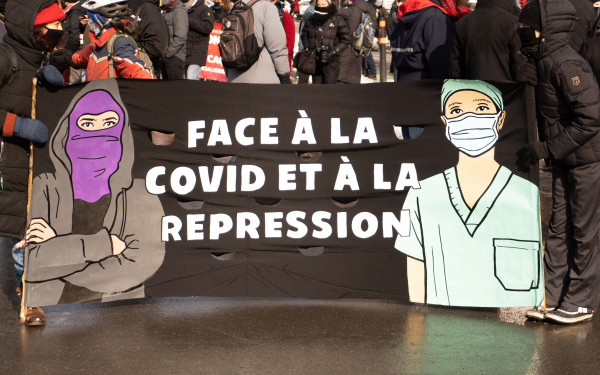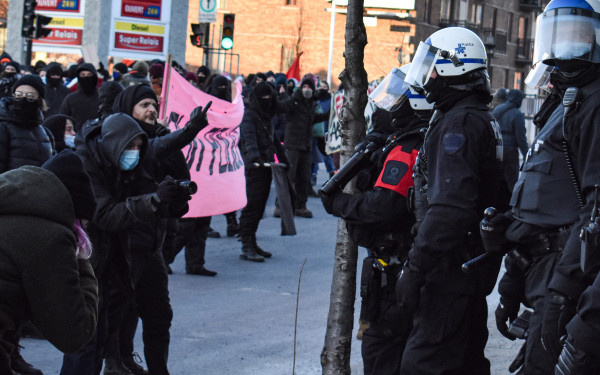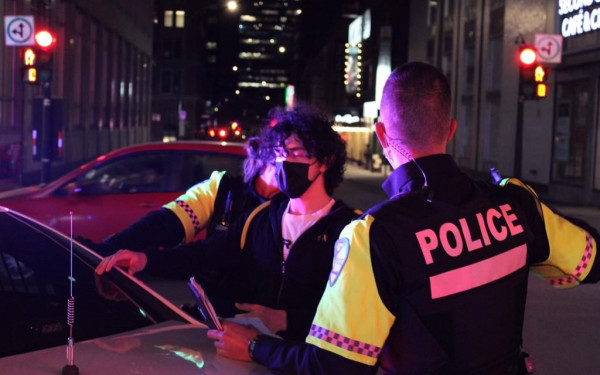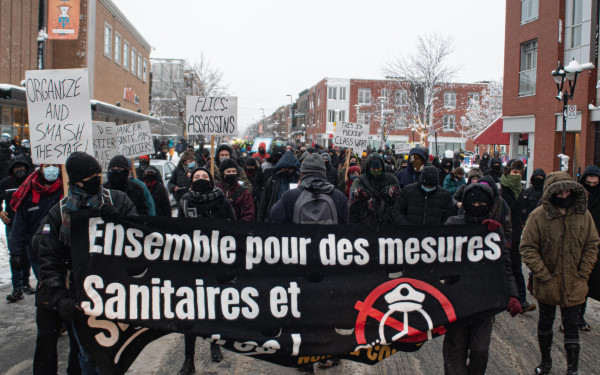Hundreds march in pro-mask anti-curfew protest
Organizers called for more equitable public health measures
On Sunday, April 19, hundreds of protestors marched from Jeanne Mance Park to denounce the 8 p.m. curfew reinstated a week prior. According to the Facebook event hosted by activist groups Printemps tout le temps and Pas de solution policière à la crise sanitaire, organizers emphasized a “pro-mask, anti-police state” demonstration, saying “the answer to a public health crisis is not to render the most marginalized people even more precarious.”
Organizers led supporters on a walk through the Plateau-Mont-Royal with signs and chants of “tout le monde déteste le couvre-feu” (everyone hates the curfew). While the protest ended back at Jeanne Mance Park before curfew began, police made one arrest and issued two tickets.
Police presence began to mount as early as 5:30 p.m., with tensions rising throughout the march. Dozens of police outfitted in riot gear could be seen waiting for protestors on the corner of Prince Arthur St. W and Park Ave. When the crowd began to turn onto Park Ave. from Prince Arthur St. W, police descended onto protestors from the sidewalk and began to make arrests.
“The curfew is a repressive and classist measure that does not affect all individuals the same way,” said Chantal Montmorency, a representative of L’Association Québécoise pour la promotion de la santé des personnes utilisatrices de drogues. “This measure stigmatizes vulnerable people and has taken away their health and security. This is why our association will soon contest these measures in court.
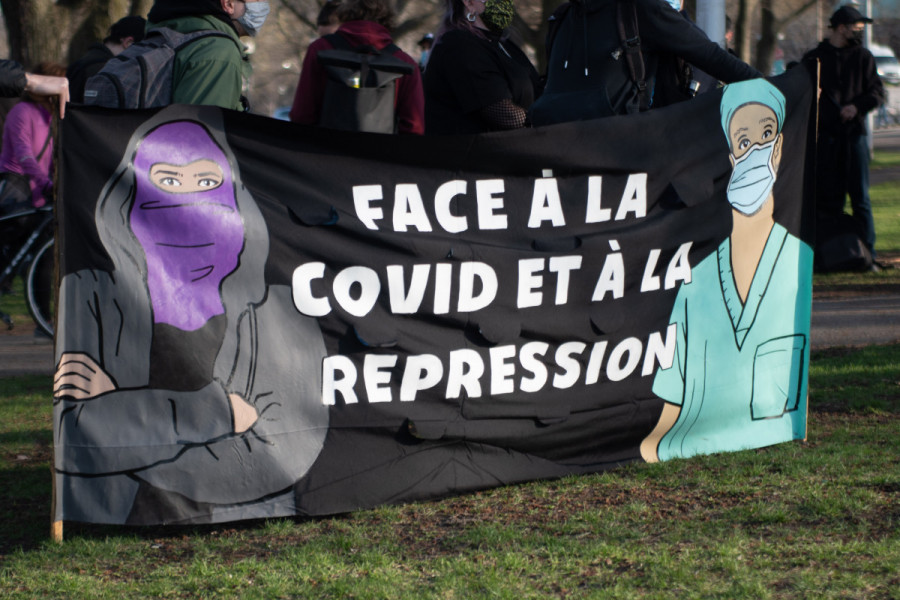
“Three months of record-breaking numbers of suicides, femicides, drug overdoses—three months of deaths and suffering by total indifference. Mr. Legault, when will our lives count?” Montmorency said.
The protest drew support from activist group Socialist Fightback Students, a Canada-wide student organization. The group advocates for women’s emancipation, anti-oppression, workers’ rights, and anti-racism amongst other progressive values.
“We’re here today because we oppose the curfew, and we think that the Legault government is trying to frame this pandemic as only the responsibility of individuals,” said Simon Berger, a member of SFS. “The truth is that most of the outbreaks are happening in schools and workplaces because there are insufficient measures. We think it’s because [the government] wants to keep as many workplaces open as possible, to make as much profit as possible.
“The curfew is a repressive and classist measure that does not affect all individuals the same way.” — Chantal Montmorency
Since Jan. 9, a curfew has been enforced as hospitalizations throughout the province surged. In mid-March, curfew was pushed to 9:30 p.m. as death rates began to drop. Last Sunday was the first day that the 8 p.m. curfew was reinstated, with what Premier François Legault claimed to be a precautionary measure. Young Montrealers have grown increasingly frustrated over the lack of scientific data that proves the effectiveness of curfews on the spread of the virus.
Protests began from a separate group last Sunday in Montreal’s Old Port, with some rioters damaging businesses in the neighbourhood. Two nights of further protests followed, all of which took place after curfew hours. Hundreds of arrests and tickets were issued throughout the demonstrations.
“I’ve been patiently waiting for more progressive organizations to jump in,” said protestor Sam Miriello, a student at Concordia University. “I feel like this last week made it really difficult to stand up against the curfew without looking like a conspiracy theorist.
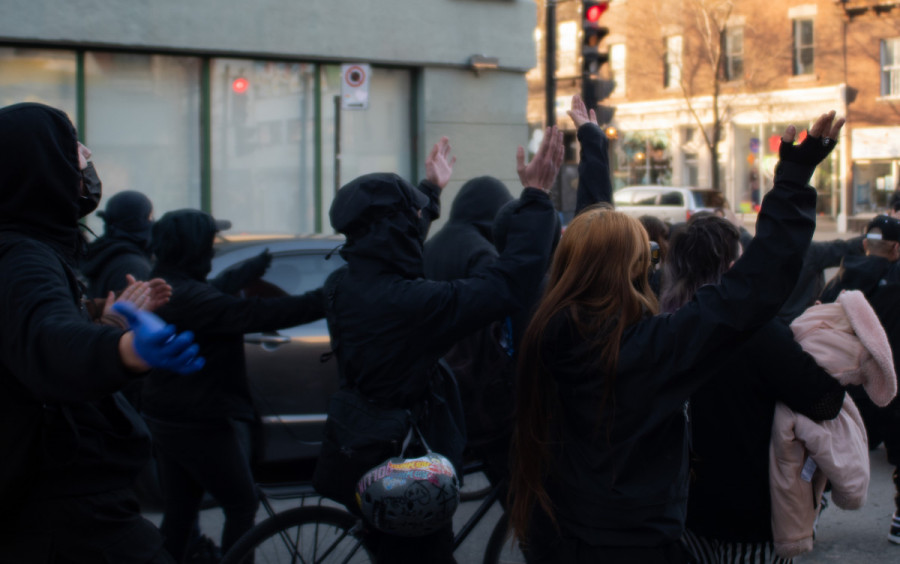
Organizers led the crowd back to Mont Royal Park at around 7:15 p.m. Minutes later, some clashes between protestors and police took place. The crowd shouted and booed police, who eventually retreated into their vehicles. The protest ended before the 8 p.m. curfew began.
Although earlier anti-curfew demonstrations from separate organizers have been criticized for vandalism and flouting public health measures, many echo the disapproval of the curfew and its impacts.
“There’s a lot of ways the curfew impacts people, and yes, there are deaths,” said Miriello. “But there is also the massive discomfort of everyone that I think deserves to be considered as well. People don’t have to die to be heard, they don’t have to be attacked to be heard. They can just not enjoy a policy, and I think that’s okay as well.”



